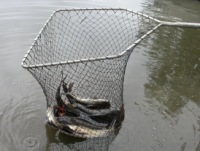Turning the Tide on Falling Fish Stocks
 UNEP-Led Green Economy Charts
UNEP-Led Green Economy ChartsSustainable Investment Path
New York - Investing around US$8 billion a year in rebuilding
and greening the world’s fisheries could raise catches to 112
million tonnes annually while triggering benefits to industry,
consumers and the global economy totalling US$1.7 trillion over the
next 40 years.
These are among the findings of a new,
landmark report being compiled by the United Nations Environment
Programme (UNEP) and economists entitled the Green Economy- part of
which was previewed today in New York.
The investment, some of which can be covered
by phasing down or phasing out some of the US$27 billion-worth of
fishing subsides currently in place, is needed to dramatically
reduce the excess capacity of the world’s fishing fleets while
supporting workers in alternative livelihoods.
Fisheries-Facts and Figures
- It is estimated that there are currently 35 million fishers and
more than 20 million boats actively engaged in fishing. - Fisheries directly and indirectly support 170 million jobs and
US$35 billion in incomes to fishing households annually. - If post-fishing activities are factored in, along with an
assumption that one fisher has three dependents, then about 520
million people or eight per cent of the global population are
supported by fisheries.
Mismanagement, lack of enforcement and subsidies totalling over
US$27 billion annually have left close to 30 per cent of fish
stocks classed as “collapsed”-in other words yielding less than 10
per cent of their former potential.
- Only around 25 per cent of commercial stocks-mostly of
low-priced species-are considered to be in a healthy or reasonably
healthy state. - On current trends, some researchers estimate that virtually all
commercial fisheries will have collapsed by 2050 unless urgent
action is taken to bring far more intelligent management to
fisheries north and south.
The report estimates that of the US$27 billion-worth of
subsidies, only around US$8 billion can be classed as ‘good’ with
the rest classed as ‘bad’ and ‘ugly’ as they contribute to
over-exploitation of stocks.
Funding is also required to reform and
re-focus fisheries management, including through policies such as
tradable quotas and the establishment of Marine Protected Areas, in
order to allow depleted stocks to recover and grow.
Such measures, backed up by bold and
forward-looking investments, would not only generate important
economic and environmental returns. They would also assist in
fighting poverty by securing a primary source of protein for close
to one billion people.
Achim Steiner, UN Under-Secretary General
and UNEP Executive Director, said today: “Fisheries across the
world are being plundered, or exploited at unsustainable rates. It
is a failure of management of what will prove to be monumental
proportions unless addressed.”
“The lives and livelihoods of over half a
billion people, linked with the health of this industry, will
depend on the tough but also transformational choices Governments
make now and over the years to come,” he added.
Source: www.unep.org
You can return to the main Market News page, or press the Back button on your browser.

